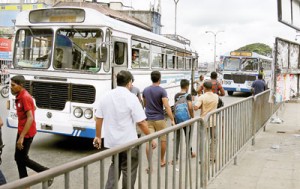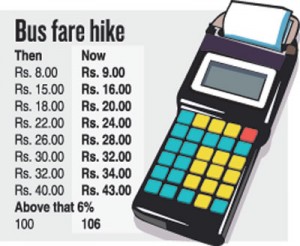News
Bus fares up but commuters’ rights to better service not addressed
This week, private bus operators got yet another increase of 6% on fares, but passengers complain that their right to a better service has failed, as always to draw attention during negotiations. Complaints include overcrowded buses and the uncouth behaviour of conductors and drivers who treat passengers like herds of cattle.
 Critics argue that although there are provisions in the Transport Act for negotiations for better service when talks are being held regarding fare increases, authorities invariably ignore the former clause.
Critics argue that although there are provisions in the Transport Act for negotiations for better service when talks are being held regarding fare increases, authorities invariably ignore the former clause.
Prof. Amal Kumarage, Senior Professor Transport and Logistics Management, Moratuwa University and the author of the formula for bus fare revisions designed in 2001, said, authorities ignore this clause in the Act because there was no binding government legislation to monitor the service provided by the 10,000 private owned buses and the 5500 state owned buses plying on the roads. “We need to introduce a structured plan to improve the service,” he said.
He said the problem can be addressed by introducing an efficient business model which would include improvements on the infra-structure of the country, trained operators and safety precautions for workers and commuters. Bus operators have little toilet facilities, lack safe parking spaces and are subject to extortion by unscrupulous elements, he said.
He said it was also important to maintain timetables and make regular checks on the roadworthiness of buses plying the roads. Regulations regarding the issuance of tickets and insisting on the bus crew wearing uniforms should be strictly enforced, he said.
“By and large our system is outdated. It has been like this for over 35 years,” he added.
 Prof. Kumarage said Sri Lanka needs a sustainable model and this can be achieved only if the central government and provincial councils work together. Meanwhile Lanka Private Bus Owners’ Association President,(LPBOA) Gemunu Wijeratne said during the recent discussions he had put forward proposals for a better service for commuters.
Prof. Kumarage said Sri Lanka needs a sustainable model and this can be achieved only if the central government and provincial councils work together. Meanwhile Lanka Private Bus Owners’ Association President,(LPBOA) Gemunu Wijeratne said during the recent discussions he had put forward proposals for a better service for commuters.
They included stopping semi luxury buses from overloading passengers, long distant buses to close doors when plying the roads and penalizing buses that waited a long time at bus halts to collect more passengers. He said that LPBOA has over 500 members and is satisfied with the 6% increase in the fares that the government announced last week. He said 12 factors were considered when calculating the increase including the cost of fuel, oil and lubricant, tyres, tubes, repairs, air condition repairs, finances, provision for risks, daily and monthly overheads and annual over heads.
“This was the maximum we could ask for,” he said. However other unions held different views. Lanka Private Bus Federation said the hike was insufficient. President Stanley Fernando said the increase was after three years and a 6% hike did not even cover their running cost. He lamented that the government’s refusal to increase the first segment of the journey to Rs.10 would only benefit drivers and conductors of the buses as the commuters never get back their change.
“We cannot do this. The prices of oil, tyres and tubes have gone up from 50% to 200%. In addition we have to pay money to extortionist to be in the business,” he added National Transport Commission (NTC) chairman M.A.P. Hemachandra said they are trying to strictly impose rules on operators who come under its purview. The rules would include wearing uniforms and issuing tickets to commuters. He said action would be taken on reckless driving and on drivers on the same route numbers who compete to take more passengers. “They are putting the lives of passengers and pedestrians at risk,” he said.
He pointed out however that these things cannot be done overnight as they lacked staff. “We have 43 vacancies that have to be filled,” he said.

